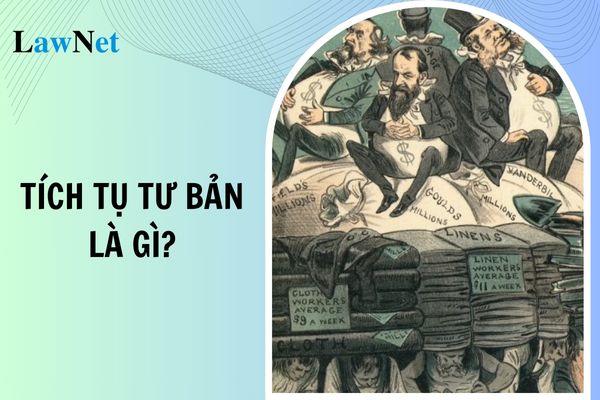What does capital accumulation mean? What are the essence, origin, and consequence of capital accumulation? Is Marxist-Leninist Philosophy a mandatory subject in Vietnam?
What does capital accumulation mean? What are the essence, origin, and consequence of capital accumulation?
In the thoughts of Karl Marx, capital accumulation means an objective and inevitable process in the development of the capitalist mode of production. It reflects the increase in capital scale through the reinvestment of surplus value back into the production process, thereby increasing the volume of capital and expanding the production base.
The essence of capital accumulation
Capital accumulation is a characteristic economic phenomenon of capitalism, reflecting the increase in capital scale through the reinvestment of surplus value into the production process. According to Karl Marx's ideology, surplus value is a product created by hired labor that exceeds the value of labor power paid by the capitalist. The essence of capital accumulation is reflected in two aspects:
- Internal growth: capital accumulation is a continuous reinvestment process aimed at expanding the scale of production and increasing competitive capacity.
- Exploitation of surplus value: This is the basis for the capitalist to accumulate capital, strengthening their position in the production base.
The Origin of capital accumulation
The origin of capital accumulation stems from surplus value—the part of value created by hired labor but not received in the form of wages.
Capital accumulation is a result of the internal drive within the capitalist system, where profit is the ultimate goal. The capitalist always seeks to maximize surplus value, leading to the process of capital accumulation becoming an inevitable trend in the capitalist production base.
The consequences of capital accumulation
The process of capital accumulation creates extensive economic and social impacts such as:
- Intensification of class conflicts: capital accumulation increases the exploitation of capital against labor, leading to discontent within the working class. The growing disparity between the capitalist and the laborer deepens class conflicts.
- Strengthening of large capital power: As capital accumulation occurs, large capitalists expand their production scale and overwhelm small capitalists, leading to the formation of monopolistic economic conglomerates. This results in the loss of free competition—once the foundation of capitalism.
- Increased production efficiency but causing overproduction crises: capital accumulation implies increasingly larger, more efficient production due to high-tech applications. However, in an economy where consumption is based on the limited purchasing power of laborers, increased production can lead to overproduction crises when goods cannot be fully consumed.
- Accumulation and pauperization: While capital increasingly accumulates, the majority of hired laborers receive only subsistence wages. This process leads to the pauperization of the working class, causing them to lose control over the means of production.
Note: The above content is for reference only!

What does capital accumulation mean? What are the essence, origin, and consequence of capital accumulation? Is Marxist-Leninist Philosophy a mandatory subject in Vietnam? (Image from the Internet)
Is Marxist-Leninist Philosophy a mandatory subject in Vietnam?
Article 1 of Decision 494/2002/QD-TTg stipulates that Marxist-Leninist Philosophy, Marxist-Leninist Political Economy, Scientific Socialism, History of the Communist Party of Vietnam, and Ho Chi Minh Thought (for universities and colleges); Political subject (for professional secondary and vocational schools) are mandatory subjects:
- For Vietnamese nationals and foreigners studying at universities, colleges, professional secondary and vocational schools opened by Vietnam or schools opened in Vietnam in partnership with foreign entities;
- For Vietnamese nationals studying at universities, colleges, professional secondary and vocational institutions with 100% foreign investment.
These subjects are not mandatory for foreigners studying at wholly foreign-invested universities, colleges, and professional secondary and vocational institutions but are encouraged.
Thus, Marxist-Leninist Philosophy is one of the mandatory subjects that students must take at universities and colleges.
What is the preferential allowance for lecturers of Marxist-Leninist sciences?
According to Article 2 of Decision 244/2005/QD-TTg, the regulations are as follows:
Allowance level and calculation method
1. The preferential allowance for educators is specified as follows:
a) A 25% allowance level applies to educators directly teaching in universities, colleges, academies, and training schools of Ministries, equivalent bodies, bodies under the Government of Vietnam, Communist Party organizations, and socio-political organizations at the central level, and political schools of provinces and centrally-affiliated cities (excluding educators teaching in pedagogical schools, pedagogical faculties, and those teaching Marxist-Leninist sciences and Ho Chi Minh Thought);
...
dd) A 45% allowance level applies to educators directly teaching Marxist-Leninist sciences and Ho Chi Minh Thought in universities and colleges;
Thus, lecturers of Marxist-Leninist sciences are entitled to a 45% preferential allowance for educators.

